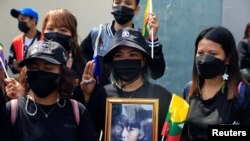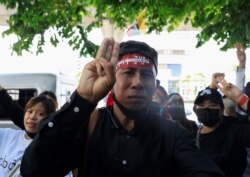On Monday, July 25, Myanmar’s military junta announced it had hanged four democracy activists – the country’s first executions in decades.
Former National League for Democracy lawmaker and hip-hop artist Phyo Zeya, and prominent democracy activist Kyaw Min Yu (a.k.a. Ko Jimmy), were accused of “terrorism” for allegedly helping fight against military rule.
The other two men, Hla Myo Aung and Aung Thura Zaw, were convicted in April 2021 for allegedly torturing and killing a military informant.
The executions sparked international condemnation, including from Southeast Asian states whose efforts to mediate peace in the war-torn country have stalled.
A spokesperson for the Myanmar junta defended the executions, Reuters reported.
“Junta spokesperson Zaw Min Tun said the executions were not personal but conducted under the law, and the men were given a chance to defend themselves. He said the military government knew the executions, the first in decades in Myanmar, would draw criticism,” the news agency said on Tuesday, July 26.
That is false. All four were tried in closed military courts with no right to appeal. As the proceedings were neither independent nor public, it’s unclear what defense options they had. Critics maintain the executions were politically motivated.
On July 25, Myanmar’s state run Global New Light of Myanmar put out a brief article announcing the death sentences had been carried out “under the law.”
“[The executed men] gave directives, made arrangements, and committed conspiracies for brutal and inhumane terror acts such as murdering, many innocent people died in cases,” the paper reported.
The statement did not confirm the time or method of execution, but when the four were sentenced in June, Zaw Min Tun said they would be “hanged according to prison procedures.”
The Assistance Association for Political Prisoners (AAPP), run by Myanmar citizens in exile, argues that the junta, which seized power by force in February 2021, has no lawful right to carry out executions.
“These four political prisoners were detained by an illegal and murderous junta. The trial was a kangaroo court. Any forced confessions the outcome of mental and physical abuse.
“If they executed the four, it is a crime. Min Aung Hlaing committed murder. The junta is illegal, unelected by the people, they have no right to execute,” the AAPP said in a statement.
Min Aung Hlaing, leader of the coup, has been Myanmar’s military commander-in-chief for the past decade.
As of July 26, The AAPP said 2,123 people have been killed as a result of the military crackdown following the coup.
Ko Jimmy was convicted of contacting the opposition coalition and militia network that was organized after the military seized power from the democratically elected government.
The junta also convicted Ko Jimmy of advising local militia groups in Yangon and ordering the opposition People’s Defense Force (PDF) – the armed wing of Myanmar’s government in exile – to attack security forces and government offices, among other charges.
Phyo Zayar Thaw was accused of funding and supplying weapons to the PDF, and involvement in attacks.
Although both men had a history of nonviolent activism prior to the coup, many in Myanmar turned to armed resistance after the military’s brutal crackdown.
As noted by an editorial in Myanmar Now, an independent news site in Yangon:
“While we may never know the truth about their involvement in the armed resistance, we do know that they were captured late last year and accused of plotting guerrilla attacks. Then, after a perfunctory trial by a military tribunal, they were summarily sentenced to death.
“By executing two other men, Hla Myo Aung and Aung Thura Zaw, who had been convicted of murder for killing suspected military informants, on the same day as Ko Jimmy and Phyo Zayar Thaw, the regime may have wished to portray them all as the worst sort of common criminals – the sort that has no regard for human life.”
As Myanmar is embroiled in a civil war, parsing “guerrilla” and “terrorist” violence is a contentious matter.
The junta itself has been credibly accused of terrorism for directly targeting civilians to achieve political ends. The military has indiscriminately shelled and bombed villages and engaged in systematic arson, burning down villages to break resistance to its rule.
The armed resistance is anything but uniform, with numerous ethnic armed groups fighting alongside the PDF. Some anti-junta forces have been accused of targeting military collaborators.
All that said, no evidence has been presented showing Ko Jimmy or Phyo Zayar Thaw played in part in killing “many innocent people.”
That is because the courts under the Myanmar junta operate with impunity and without transparency.
The U.K. rights group Amnesty International noted that after martial law was imposed in March 2021, “the authority to try civilians was transferred to special or existing military tribunals, where individuals are tried through summary proceedings without right to appeal.”
“Under international law and standards, executions carried out following unfair trials violate the prohibition against arbitrary deprivation of life, as well as the absolute prohibition of torture and other cruel, inhuman or degrading punishment.”
Tom Andrews, the U.N. Special Rapporteur on the situation of human rights in Myanmar, condemned the executions as “cruel violations of the rights to life, liberty and security of a person, and fair trial guarantees.”
Andrews said the men had been “tried convicted and sentenced … without the right of appeal and reportedly without legal counsel, in violation of international human rights law.”
Elaine Pearson, acting Asia director at Human Rights Watch (HRW), also said the executions “followed grossly unjust and politically motivated military trials.”
Amnesty International’s Regional Director Erwin van der Borght said the executions fit into a broader pattern of the junta using capital punishment to arbitrarily deprive people of life.
“The four men were convicted by a military court in highly secretive and deeply unfair trials. The international community must act immediately as more than 100 people are believed to be on death row after being convicted in similar proceedings,” van der Borght said.
HRW earlier documented “the long and troubling history” of military trials in Myanmar. The group said “the rules of evidence and procedure applicable in civilian courts did not apply” to past trials, which were “conducted behind closed doors.”
HRW found that people tried by the military tribunals were also certain to be convicted, regardless of the legitimacy of the case against them.
In February, the International Commission of Jurists (ICJ) said there was “no rule of law or judicial independence” in post-coup Myanmar.






